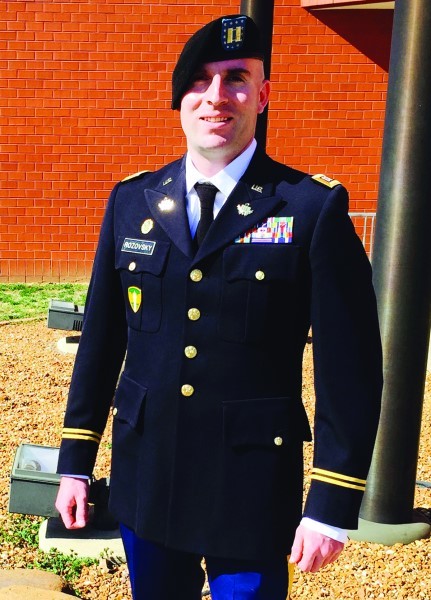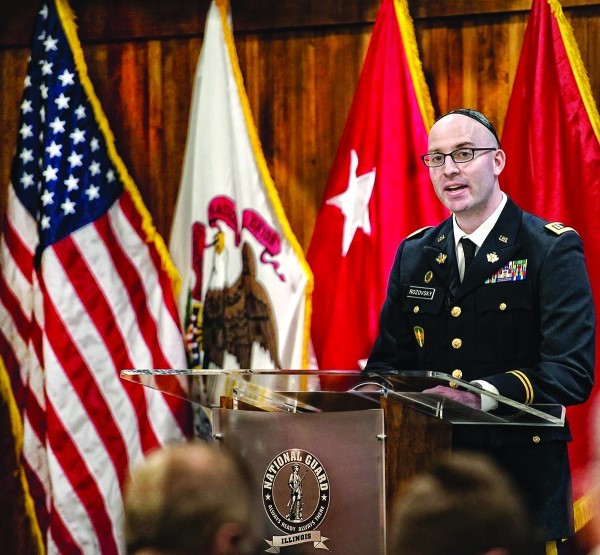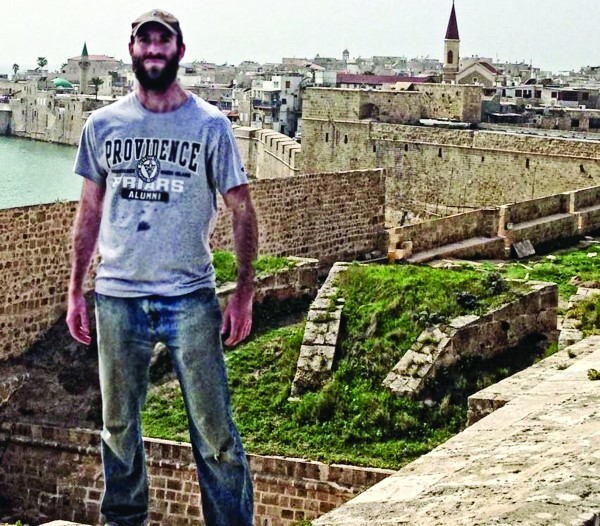Captain to make history as R.I. Army National Guard’s first Jewish chaplain
Capt. Aaron Rozovsky, 31, who has just been appointed the Rhode Island Army National Guard’s first Jewish chaplain in its 380-year history, has deep Ocean State roots.
Despite being born in Nova Scotia, Canada, and not growing up in Rhode Island, the state is close to his heart. Rozovsky, who will be ordained a rabbi on June 2, traces his local roots to his mother Fay née Frank), a Rhode Island native who was among the first women to graduate from Providence College. He, too, earned a bachelor’s degree from PC, in history, in 2008, before earning a master’s in international studies from Central Connecticut University in 2012. Rozovsky most recently has been studying at Hebrew Union College-Jewish Institute of Religion, in Cincinnati.
“No matter where I’ve lived, I have always considered Rhode Island to be home,” Rozovsky said recently. “My mom’s side of the family is from Rhode Island.” His family also includes his great-uncles, the late Charles and Albert Samdperil, and his uncle and aunt, Gerry and Ann Goldstein.
Rozovsky’s love of Judaism also was nurtured locally. “I spent a lot of my summers with my grandparents in Cranston and at my aunt and uncle’s farm in Greenville,” he said. “For many years, no matter where we were, we attended high holiday services at Temple Beth-El [in Providence], where we loved listening to Rabbi Leslie Gutterman.”
The Jewish Voice chatted with Rozovsky via email; an edited version of the interview follows:
Q: When and why did you join the Guard?
A: I simultaneously enlisted in the Rhode Island Army National Guard and accepted an Army ROTC scholarship in 2006 at Providence College. I joined because I love everything this country stands for – our incredible religious, racial and political and cultural diversity, the freedoms of religion, speech, press, and assembly. These things are so precious that I believe they are worth fighting and dying for. I was 15 and a sophomore in high school when 9/11 took place. When I saw the planes hit the towers, I remember I had the same feeling that I experienced the first time my parents told me that part of our family had been murdered in the pogroms. I felt called to do something, and I’ve never looked back.
Q: When and where did you serve?
A: I deployed to Guantanamo Bay, Cuba, from October 2009 to October 2010. I served as the leader of a quick reaction force platoon. I deployed to Afghanistan from March 2011 to March 2012, where I served as a battle captain. Both deployments were transformative experiences. The greatest part of both Cuba and Afghanistan, however, was the honor and privilege of serving with men and women who cared so deeply about our country.
Q: How much did your faith keep you going?
A: Faith was a big part of my deployment experiences. I read a lot of the TANAKH, midrash, Talmud, Rashi and Rambam. I served as a Jewish lay leader at both bases. I prayed a lot when I ran. Friday night Shabbat services were probably the highlight of my week [while] overseas.
Q: When and why did you decide to study to be a rabbi?
A: I decided I wanted to be a rabbi during my first deployment. I realized I not only enjoyed helping and comforting people, but also that I loved the richness of Jewish history, text, theology, culture and philosophy. When one of my NCOs noticed this, he suggested I become a rabbi. I laughed it off, but after a couple of days, I realized how right he was.
Q: Were you religious growing up?
A: Religion was a big part of my life growing up. I went to Shabbat services with my family every Friday and Saturday, attended Hebrew school and was part of BBYO. My father [Lorne, who died in 2013] served as the president of our shul when I was in high school.
Q: What do you hope to accomplish in your new post?
A: What makes this a big deal is that while the Rhode Island Air National Guard dates to 1939 [and has already had a Jewish chaplain], the Rhode Island Army National Guard is one of the oldest military organizations in the United States, dating to 1638. My goal will be to provide the best religious, moral, ethical, spiritual and emotional support I possibly can to all of our soldiers and their families. Finally, I hope to be given the opportunity to provide our Jewish servicemen and women with a rich Jewish life while deployed far from home.
Q: What advice do you have for anyone contemplating a similar career?
A: It’s never about you. It’s about the people and institutions you serve. In that sense, the rabbinate is very much like the military as they both promote selfless service.
Q: Many synagogues and temples are being forced to merge as members dwindle. Do you have any advice on how spiritual leaders can retain worshippers?
A: Being creative, innovative and adaptable are going to be the key. A rabbi can no longer expect people to come to synagogue ‘just because.’ Rather, you as the rabbi have to meet congregants where they are, at venues they are interested in and in modes they want. This is why programs such as Torah on Tap and Running with the Rabbi are so successful. At the Army Chaplain School, they always told us: ‘Get out of the chapel and the chaplain’s office. Go on PT [physical training] runs with your soldiers. Go on 12-mile ruckmarches with them, carrying the same weighted packs they are. … This is how you will earn their trust and confidence.’ I think the same thing applies in the rabbinate.
Q: What do you do in your free time?
A: I love running. I find it not only good for my health, but also emotionally calming, spiritually uplifting, and mentally stimulating. I try to run at least five miles a day.
Q: Who was your biggest influence?
A: I’ve been blessed that I have had incredible friends, teachers, coaches and mentors throughout my life who have always been there to guide and help me. I think it would actually be unfair to pinpoint just one.
LARRY KESSLER is a freelance writer who can be reached at lkessler1@comcast.net.













